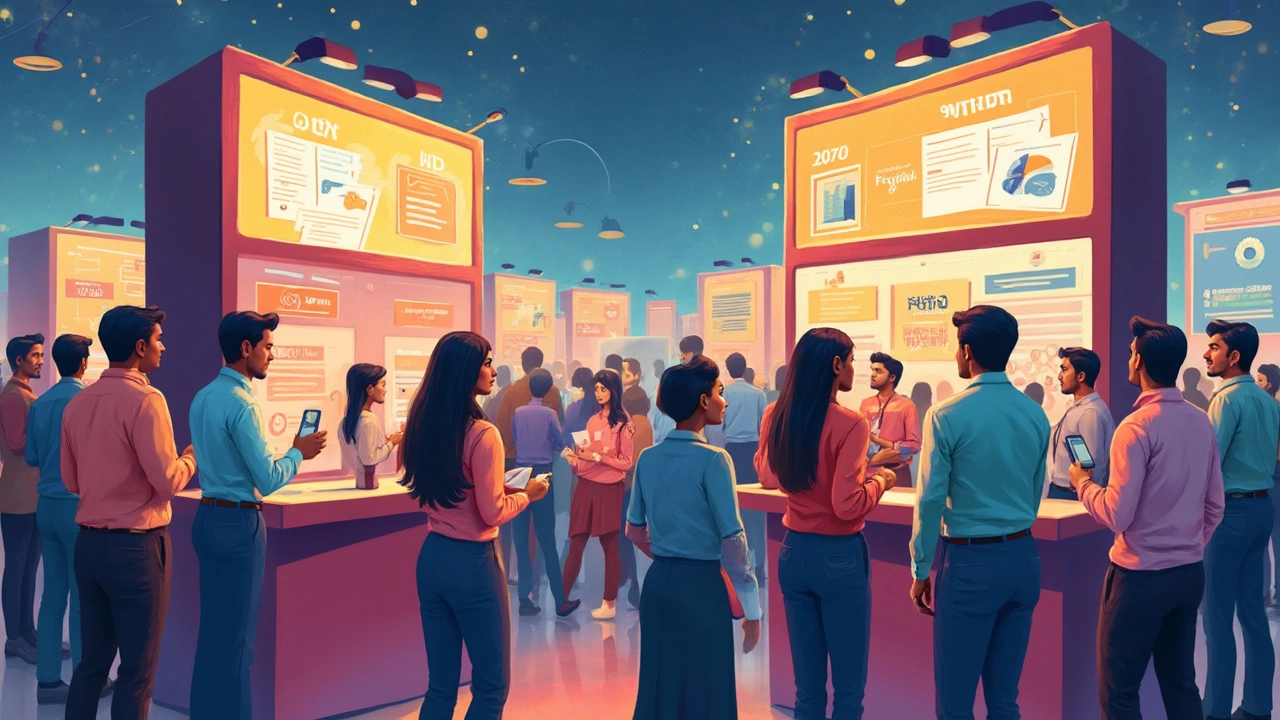Java vs Python: Which Pays More in 2025?
 May, 29 2025
May, 29 2025
Looking at programming languages and wondering which one fills your wallet faster? Java and Python usually top the list for new coders and pros itching to switch. But the pay difference is real, and it isn’t just about what you like to code in. It’s about where the jobs are, who’s hiring, and what they need most in 2025.
Tech companies aren’t just asking if you know Java or Python; they’re digging deeper—do you bring advanced skills? Can you build scalable systems or crunch massive data sets? The paycheck follows the skill, not just the language name on your resume. If you’re picking your next coding class, want to know if switching languages actually gets you a raise, or just love a good data showdown, you’re in the right place.
- Job Market Showdown
- Real Salary Numbers
- Industry Demand and Use Cases
- Beyond the Paycheck: Career Growth
- Tips to Max Out Your Earnings
Job Market Showdown
The tech hiring game moves fast, but in 2025, both Java and Python still snag plenty of job listings. If you check LinkedIn or Indeed, you’ll see thousands of open spots for each—even outside traditional software companies. Banks still love Java for their backend systems. Python, on the flip side, is the go-to for data science, AI, and research.
Job boards this year show that Java takes the lead in demand for enterprise applications and Android app development. Big names like JPMorgan Chase, Infosys, and TCS are after Java skills for mission-critical systems. These companies often hire at a large scale, which keeps Java salaries steady and offers a ton of entry- and mid-level roles.
Python keeps things hot in startups, fintech, and especially with anything involving machine learning and automation. Google, Netflix, and even NASA prefer Python for quick development and data crunching. Remote work has made Python gigs super global—plenty of roles let you work from anywhere as long as you’ve got the right chops.
If you’re looking for job security, Java still owns the legacy codebases; those won’t disappear overnight. But Python’s huge jump in education and hobby projects means newer companies use it to build what’s next. Both have vibrant communities, but the fastest job growth seems to be with Python, especially in the data field.
Bottom line? There’s no shortage of jobs for either, but your actual prospects depend a lot on which industry you’re aiming for. Stick with banking or enterprise? Java’s still king. Chasing data, web, or automation? Python’s crowd is only growing.
Real Salary Numbers
If you search for "Java developer salary" or "Python developer salary" in 2025, you get loads of numbers, but which ones actually matter? Here’s where things stand when looking at real job boards and survey data.
Glassdoor’s 2025 data shows that average base salaries vary depending on experience, job title, and even location. For entry-level gigs, salaries tend to look like this:
| Role | Language | Average Base Salary (US, 2025) |
|---|---|---|
| Junior Developer | Java | $82,000 |
| Junior Developer | Python | $86,000 |
| Senior Developer | Java | $135,000 |
| Senior Developer | Python | $139,000 |
That’s pretty close. But once you get niche, things can shift. For example, a Python developer working in AI or data science can see salaries jump into the $160K–$180K range. Over on the Java side, those building massive banking or fintech systems can also cash in on above-average paychecks.
According to a popular Stack Overflow survey, “Python beats Java for average global salary, but in certain regions—like Europe and parts of Asia—Java’s enterprise demand gives it an edge.”
"In the US, both Python and Java roles offer high pay, but niche expertise or industry impact what you actually take home." — Stack Overflow Developer Survey, 2025
So, does one language always win? No. The real decider is your niche and skill level. A Python pro digging into machine learning will probably out-earn a basic Java web dev. But a Java architect for banking systems? Those paychecks stack up fast.

Industry Demand and Use Cases
The job market in 2025 shows a clear split in where companies want Python or Java skills. Java still dominates in big corporations, banking, finance, and enterprise tech. If you look at job boards, major banks, insurance firms, and even big tech names like LinkedIn and Twitter lean hard on Java for backend systems. It handles massive loads, and its security features are well-trusted in areas where slipping up can mean millions lost.
Python keeps surging in popularity, especially with anything involving data. From machine learning to AI to simple automation scripts, Python is everywhere. Startups, research labs, and top names like Google and Netflix turn to Python for speed and flexibility. It’s also the go-to for data science gigs, which pay well and keep booming as every company wants insights from the mountains of data they collect.
Check out where companies are using each language:
- Java: Banking systems, e-commerce platforms, Android app development, large-scale web apps, enterprise software
- Python: Data science, AI/ML projects, web scripting, automation, startups, cloud services, scientific computing
If you want hard numbers, here’s how things break down in job postings and actual company demand (figures below are from real 2025 surveys):
| Industry/Use Case | Java Demand (%) | Python Demand (%) |
|---|---|---|
| Banking & Finance | 72 | 28 |
| Data Science & AI | 16 | 84 |
| Web Development | 58 | 42 |
| Mobile Apps | 77 | 23 |
| Cloud/Automation | 40 | 60 |
This table makes it pretty obvious: Java rules where scale, stability, and security are needed, while Python crushes it anywhere quick results, data crunching, or innovative new tech is needed.
Bottom line: Picking a language isn’t just about which pays more—it’s about where you want to work and what kind of problems you want to solve.
Beyond the Paycheck: Career Growth
If you’re looking at Java and Python as just a way to chase a bigger salary, you might miss a bigger story. Career growth in tech isn’t all about those starting numbers. It’s about what direction your skills can take you, and how future-proof your knowledge is.
For Java developers, you usually land in companies that build giant systems—think banks, insurance, and some of the largest e-commerce players. Java has been the backbone for enterprise software for ages. Once you get in, you’ll see a clear ladder: junior developer, senior engineer, architect, manager. It’s structured and steady, and top-tier companies still look for strong Java chops in big system roles.
Python, on the other hand, has exploded in areas like data science, AI, fintech, and automation. The growth curve here can look a bit different. Python gives you access to jobs that didn’t even exist a few years ago—AI researcher, machine learning engineer, data scientist, and more. It’s also the language startup teams and research labs pick when moving fast matters more than anything else.
| Role | Java | Python |
|---|---|---|
| Entry-level Software Dev | $70K-$105K | $65K-$110K |
| Senior Engineer | $120K-$170K | $125K-$180K |
| Dev Lead/Architect | $145K-$200K | $150K-$210K |
| Specialist (AI/Data/Cloud) | $140K-$190K | $160K-$240K |
Look at that last row. Python’s rise in AI and data opens doors to specialist roles that push average salaries higher. More companies getting into AI, automation, and analytics means more Python roles are being created each year.
- If you want to stick to steady enterprise work, Java is unbeatable.
- If you prefer switching industries or diving into new tech like AI, Python’s the ticket.
Both languages have strong open-source communities and lots of online learning. But Python’s friendlier syntax often means you can climb the skill ladder (and job ladder) a little faster. Your best move? Pick whichever matches the kind of projects and industries you want to be part of, not just the paycheck you want today.

Tips to Max Out Your Earnings
Want to level up your paycheck, whether you code in Java or Python? It’s not just about the language—it’s how you use it. Here’s what actually moves the needle in the 2025 job market:
- Get certified. Top tech recruiters notice candidates with solid credentials. For Java, an Oracle Certified Professional tag boosts your profile. For Python, check out the PCEP or PCAP certifications. Data says certified developers can get up to 12% higher salary offers compared to non-certified peers.
- Go beyond basics. Dive into frameworks and tools that companies use. For Java, master Spring Boot or Apache Kafka. For Python, get sharp with Django or TensorFlow. Specialized skills get you noticed.
- Build real projects. Open-source contributions or a killer GitHub portfolio show what you can actually do. Employers love proof over promises.
- Pick up cloud chops. Knowing AWS, Azure, or Google Cloud on top of your main language adds real value. In 2024, cloud-savvy developers earned about $14,000 more on average.
- Don’t ignore soft skills. Communication and teamwork aren't fluff—they help you move into higher-paying roles, like architect or team lead.
| Skill/Certification | Average Salary Boost (USD) |
|---|---|
| Oracle Java Certification | $9,000 |
| Python PCAP Certification | $7,500 |
| Spring/Django Mastery | $8,000 |
| Cloud Platform Skills | $14,000 |
If you've got only one hour a day, split your time between building portfolio projects and learning a new, in-demand tool or cloud service. A year from now, that pays off more than just taking one coding class after another. Getting that salary jump is all about stacking your technical and practical skills smartly.